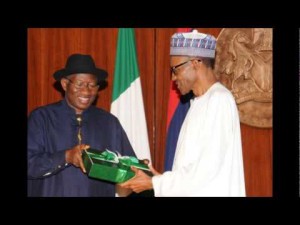Ọjọ́ itàn ni ọjọ́ kọkàndinlógún, oṣù karun, ọdún Ẹgbãlemẹ̃dógún jẹ fun orilẹ̀ èdè Nigeria àti gbogbo ilẹ̀ Aláwọ̀dúdú. Kò wọ́pọ̀ ki Ìjọba Ológun tàbi Ẹgbẹ́ Òṣèlú gbà lati gbé Ìjọba silẹ̀ ni ilẹ̀ Aláwọ̀dúdú nitori eyi àwọn Olóri Òṣèlú lati orilẹ̀ èdè bi mẹrinléladọta pé jọ si Abuja, olú-ilú Nigeria lati ṣe ẹlẹri gbi gbé Ìjọba lati ọ̀dọ̀ Olóri kan si ekeji.
Yorùbá sọ wi pé “Melo la ó kà leyin Adépèlé”, a ó ṣe àyẹ̀wò di ẹ̀ ninú àpẹrẹ àwọn Olóri Òṣèlú Aláwọ̀dúdú tó jẹ Oyè “Akintọ́lá ta kú”: Ọ̀gágun Olóògbé Muammar Gaddafi ti Libya ṣe titi wọn fi pa si ori oyè lẹhin ọdún méjilélogóji; Hosni Mubarak ti Egypt wà lóri oyè titi ará ilú fi le kúrò lẹhin ọgbọ̀n ọdún; ará ilú gbiyànjú ṣùgbọ́n wọn ó ri Bàbá Robert Mugabe (arúgbó ọdún mọ́kànlélãdọrun) ti Zimbabwe lé kúrò lati ọ̀rùndinlógóji ọdún; Paul Biya ti Cameroon ti ṣe Olóri Òṣèlú lati ogóji ọdún; Omar al-Bashir ti Sudan ti wà lóri oyè fún ọdún méjilélógún. Àwọn ọ̀dọ́ ti a lérò wi pé yio tun yi iwà padà kò yàtọ̀ bi wọn bá ti dé ipò. Pierre Nkurunziza ti Burundi gbà ki àwọn ará ilú kú, ju ki ó ma gbe àpóti ibò ni igbà kẹta lẹhin ọdún mẹwa; Joseph Kabila – Olóri Òṣèlú Congo lati ọdún mẹrinla; Olóri Òṣèlú Togo Faure Gnassingbé ti wà lóri oyè fún ọdún mẹwa lehin iku Bàbá rẹ, kò dẹ̀ fẹ́ kúrò àti ọ̀pọ̀ tó ti kú si ori oyè.
Yorùbá sọ wi pé “Ni ilú Afọ́jú, Olójú kan Lọba”, ọ̀rọ̀ yi gbà ọpẹ́ fún orilẹ̀-èdè Nigeria, nitori Olóri Òṣèlú Goodluck Ebele Jonathan, gbà lati gbé Ìjọba fún Olóri Ogun Muhammadu Buhari ti ẹgbẹ́ míràn lai si ìjà. Irú eyi ṣọ̀wọ́n, pàtàki ni ilẹ̀ Aláwọ̀dúdú. Ẹgbẹ́ Òṣèlú Alágboòrùn ti ṣe Ìjọba fún ọdún mẹ́rindinlógún ki ilú tó fi ibò gbé wọn kúrò ṣùgbọ́n fún ọ̀pọ̀lọpọ̀ Olóri àti Ẹgbẹ́ Òṣèlú ilẹ̀ Aláwọ̀dúdú, ọdún mẹ́rindinlógún kéré. Ká ni Olóri Òṣèlú Goodluck Ebele Jonathan bá kọ̀ lati ki ẹni ti ilú yàn Olóri-ogun Muhammadu Buhari ku ori ire ni idije idibo, ijà ki ba ti bẹ́. Eleyi fi hàn pé Ọlọrun ni ifẹ Nigeria, ó ku ka ni ìfẹ́ ara. A lérò wi pé àwọn Olóri àti Ẹgbẹ́ Òṣèlú ilẹ̀ Aláwọ̀dúdú yoku yio fi eyi kọ́gbọ́n
A ki Òṣèlú Goodluck Ebele Jonathan ti ó gbé Ìjọba fún Olóri-ogun Muhammadu Buhari ti ilú fi ibò yàn, àwọn ọmọ Nigeria ti ó dibò fún àyipadà àti gbogbo ọmọ Nigeria ni ilé lóko kú ori ire ọjọ́ pàtàki yi ni itàn orilẹ̀ èdè Nigeria.
ENGLISH TRANSLATION
History is made in Nigeria on Friday, twenty-nine day of May, year Two thousand and fifteen and in the entire African Countries. It is uncommon in Africa for either the Military or Democratic Government to transfer power, as a result Leaders from about fifty four Countries gathered in Abuja to witness the transfer of power from an incumbent to the newly elected.
According to Yoruba adage “How many can be counted in the overcrowded teeth of Adepele”, hence example of African Leaders who have adopted “Akintola’s seat tight” style are being examined here. Late Colonel Muammar Gaddafi, President of Libya for forty two years (1969 to 2011) until he was killed as incumbent; Hosni Mubarak, President of Egypt for thirty years till he was chased out of office during the Arab Spring in 2011; people of Zimbabwe tried to end the thirty five years’ regime of the ninety-one year old President Robert Mugabe without success; Paul Biya, President of Cameroon has been there since forty years ago; while Omar al-Bashir President of Sudan has ruled for the past twenty two years to present. The younger Africans are not faring better in position of Authority. Pierre Nkurunziza, President of Burundi is pressing ahead with his third term bid after ten years in power in spite of his people’s violent protest; Joseph Kabila, has been President of the Democratic Republic of Congo for the past fourteen years; Togo’s President Faure Gnassingbé took over leadership after the death of his father since ten years ago and he has no intention of handing over; these and so many others that died in power.
According to a Yoruba adage “In the Country of the Blind, One-eyed person is the King”, this adage calls for thanksgiving in Nigeria and commendation of the outgoing President Goodluck Ebele Jonathan for conceding defeat to the people’s elect General Muhammadu Buhari of the opposition Party. This action has averted disaster and it is a rare feat, particularly in Africa. Peoples’ Democratic Party has been in power for sixteen years before they were voted out by the Nigerian people but for many African Leaders and Political Parties, sixteen years is nothing. If President Goodluck Ebele Jonathan has refused to concede defeat to the people’s elected General Muhammadu Buhari by calling to congratulate him, Nigeria would have been thrown into chaos. This has shown that God loves Nigeria, let the people of Nigeria love each other. It is hoped that other African Leaders and Political Parties would learn from this.
It is worth saluting the courage of the outgoing President Goodluck Ebele Jonathan for agreeing to hand over power to the duly elected President Muhammadu Buhari and congratulating the Nigerian Voters that voted for “Change”, and all Nigerians both at home and abroad on this special day in the history of Nigeria.
Originally posted 2015-05-29 15:28:02. Republished by Blog Post Promoter



